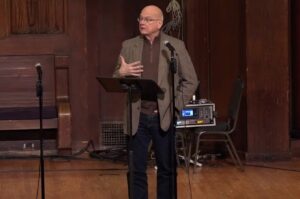There used to be social pressures to go to church and then there was a live and let live period. Now we’re moving into a period where there’s a social cost. And the more there’s a social cost, the fact is that more Christians are actually shutting up and being quiet about their faith with people around them.
At Disney World, I discovered a wonderful city of people, many of whom had never heard the Gospel, but who showed me the joy of sharing it. I watched God’s Spirit working in them: healing marriages, breaking addictions, and lifting burdens. Most of the time I parroted what I had heard on the Gospel in Life podcasts, and it would start the avalanche. By the time I ended up moving off to my volunteer ministry job, I found I hardly wanted to leave.
I began to give my heart to a god I made up in my head, a god who played fair, who gave good little Christians everything they asked for. The cross was something Christ did 2000 years ago, not anything relevant for today. Human ethics taught me I was a pretty good kid, and so I deserved pretty good things.
Presenting the gospel from the Old Testament really helps someone who is Muslim relate to what I’m saying because they are familiar with those stories in the Quran. I’m now able to explain how to see Jesus in the Noah story. And I see more Muslims responding to the gospel. Some of them will say, “We’ve never heard the gospel preached this way.” And I say, “Well, I also just learned it.” And I’m not seeing the same hostility toward the gospel.
If I felt like I was a sinner, it’s because I was a sinner. If it felt like all the things I was resting my hope in for my own righteousness were disintegrating under my feet, it’s because by His grace, they were disintegrating. “He inflicts wounds that heal,” I remember Tim Keller saying, and God was most definitely breaking my dependence on my own self-righteousness, so He could demonstrate His own righteousness as the justification for my life and salvation.
These “small faults” mean that large swaths of the Christian population have little influence on others for Christ. This is true because, while our faults always seem small to us due to the natural self-justification of the heart, you can be sure they don’t look so small to others.






